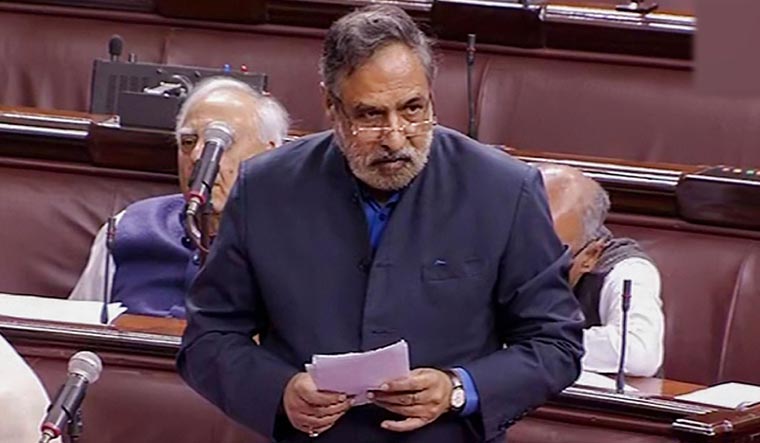Opposition parties in Rajya Sabha on Wednesday attacked the government over the economy, saying the country is heading towards a deep crisis and people do not have money to even buy day-to-day articles but the BJP countered their contention asserting the current situation is only a cyclical slowdown and will bottom out by March.
Anand Sharma (Congress), while initiating a short-term discussion on the economic situation in the country, said the current slowdown could not be labelled as a cyclical phenomenon.
"In the last few years, the economy has suffered. Industry has gone down and people do not even have money to buy day-to-day articles. Situation in the rural regions is even worse," he said.
He said that the gap between the rich and poor has widened in the country in the past few years and wrong decisions of the government like demonetisation and hasty implementation of GST have led to the present slowdown.
"It cannot be said as a cyclical slowdown. We are staring at deep economic crisis which is India specific," Sharma said.
He added that all four engines of economic activity—investments, industrial production, credit offtake and exports—were shutting down.
"The numbers are frightening. GDP growth has fallen and is lowest in seven years, investment rates have come down by seven percentage points, IIP has fallen, manufacturing sector has contracted," Sharma said.
All this has led to factory closures and job losses, he said, adding that in automotive and textiles sectors alone over 2.5 million jobs have been lost till date.
Elaborating on the auto sector, Sharma noted that the passenger vehicles production has gone down by 24 per cent while that of commercial vehicles has witnessed a drop of 62 per cent during the current fiscal.
"We expect the government to take action to spur growth but their own capital expenditure has come down... Private sector is investing, government is not spending as there is no money. All this has impacted the trust of the common man in the country's economic system," he added.
Sharma said demonetisation wrecked the unorganised sector and the government's hasty implementation of the "complex GST" wreaked havoc on the unorganised segment.
He said that the government has so far (April-September) has been able to collect only Rs 9.2 lakh crore as revenue while the target is Rs 24.6 crore.
"From where will the rest of Rs 15.2 lakh crore come in the remaining part of the financial year," Sharma questioned.
The government is staring at a fiscal deficit of 7-8 per cent, he added.
Sharma said that rural economy was in shambles and growth was not possible without putting money in the hands of farmers.
He said that not much would be achieved by reducing the corporate tax as the business houses would use the capital to retire their debts and not in investments that could lead to job creation.
"Please make MNREGA need-based, increase it to 150 days in a year keeping in mind the current situation and give Rs 400 per day under the scheme so that poor has money in his hands and economic situation improves," Sharma said.
Commenting on PSU sell-offs, he said the country created such institutions over the last 70 years and now the government is selling these profit-making companies.
Derek O' Brien (TMC) said crores of jobs have been lost in the country in various sectors including auto and textiles.
Countering the opposition's charges, Aswini Vaishnaw (BJP) termed the current situation a cyclical slowdown.
"It is not a structural thing and will bottom out by March and it will be followed by strong growth," he said.
He said the government was taking various steps to bring back growth in the Indian economy.
He cited the impact of schemes like Jan Dhan and Mudra in driving economic activity, especially in rural areas.
Nominated member K.T.S. Tulsi blamed demonetisation for the present state of the economy.
Congress leader Digvijay Singh said the Prime Minister is responsible for sluggishness in the economy because he takes decisions first and thinks about them later.
He said there are many shortcomings in GST and states are not getting their share of revenues. He also wondered how would businessmen in Kashmir would file GST returns in the absence of Internet facilities.
He further said that the government is selling profit-making PSUs which were called temples of modern India.
BJP leader Suresh Prabhu defended the government saying the present dispensation is taking a lot of steps to boost growth.
He said the Indian economy cannot remain insulated from global slowdown because it is interconnected.
T.K.S. Elangovan (DMK) also accused the government of the present state of the economy and said that it is selling profit-making PSUs.
He said that the government's priority is not development rather selling profit-making PSUs.
He also quoted NITI Aayog's forecast that economic growth will slow down further in the second quarter of this fiscal.
Elamram Kareem (CPM) suggested that a large dose of public investment is required for boosting economic growth.
V. Vijaysai Reddy and A. Navaneethakrishnan (AIADMK) also participated in the debate.


